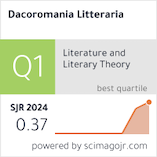MIRRORS OF ANGER: THE “COLECTIV” CASE REFLECTED IN A ROMANIAN VIRTUAL COMMUNITY (GÂNDUL)
(Abstract)
The present paper investigates the emergence of an interpretive community brought to the fore by a social crisis as well as this community’s characteristics in terms of purpose (content, theme), place (platform, technology), and discourse (linguistic articulation of ideas and interactions stemming from them). We focused on the group of commenters active on Gândul website and on the way they reacted to the news reports about the “Colectiv” case between 30 October and 30 November 2015. The 16253 comments inventoried formed a corpus of approximately 1.13 million words. The specificities of our object of research enabled us to apply a methodology based on new media approaches, lexical semantics, and corpus analysis tools. The interpretation of data led to the delineation of five topics of debate within the community’s interactions: 1. human solidarity and compassion; 2. the Orthodox Church and its position in society; 3. the “restart” of Romanian politics; 4. nationalism, xenophobia, and the people’s heroes; 5. public policies: smoking in closed areas, emergencies, and natural disasters. We found out that the tragedy acted as a trigger that rekindled the people’s interest in some previously untapped or less tackled problems of Romanian society, which are dispersed within the corpus in a reticular form. Therefore, the five mirrors of anger reflect not only the common people’s discontent with this precise case, but also with the actual state of affairs in Romania.
Keywords: virtual community, human solidarity, discourse diffusion, online conversation, corpus analysis.


